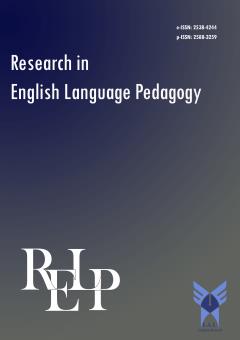A Survey of Qualities of a Good Teacher: The Case of Arab EFL Teachers and Learners’ Viewpoints
Subject Areas : Research in English Language PedagogyNooralhuda Salman Qasim Al-Dunainawi 1 , Sousan Sattar Boroujeni 2 , Sara Mansouri 3 *
1 - Department of English, Isfahan (Khorasgan) Branch, Islamic Azad University, Isfahan, Iran
2 - Department of English, Najafabad Branch, Islamic Azad University, Najafabad, Iran
3 - English Department, Najafabad Branch, Islamic Azad University, Najafabad, Iran.
Keywords: Education, EFL teachers, EFL learners, Teacher Education, Teacher qualities,
Abstract :
This study was intended to scrutinize the EFL teachers’ qualities that students appreciate and those that the EFL teachers highlighted. This questionnaire-based survey study was both qualitative and quantitative and employed a correlational method to answer the addressed questions. The participants were selected among EFL teachers and students whose native language was Arabic with different ages, academic statuses, and periods of English teaching/learning experience. The findings showed that characteristics related to the Classical Aspect were the most important for the students. For teachers, the Social-Cultural and Technology Aspects were equally important, but the teacher characteristics related to the Classical Aspect were more important than the other aspects. However, no particular pattern of similarity or difference existed between teachers’ and students’ perceptions. Moreover, the teachers’ job experiences and the students’ academic year were proved to have no significant role in their perceptions.
Alzeebaree, Y. & Zebari, I. (2021). What makes an effective EFL teacher: High school students' perceptions. The Asian ESP Journal.
Alzobiani, I. (2020). The qualities of effective teachers as perceived by Saudi EFL students and teachers. English Language Teaching, 13(2), 32-47. ISSN-1916-4742
Berger, J. L., Girardet, C., Vaudroz, C., & Crahay, M. (2018). Teaching experience, teachers’ beliefs, and self-reported classroom management practices: A coherent network. SAGE open, 8(1). Doi: 2158244017754119
Chanmanee, S. (2018). A study of characteristics of effective English teachers as perceived by high school teachers and high school students in a high school in Thailand. Language in India, 18(1). ISSN 1930-2940.
Chu, W., Liu, H., & Fang, F. (2021). A tale of three excellent Chinese EFL teachers: Unpacking teacher professional qualities for their sustainable career trajectories from an ecological perspective. Sustainability, 13(12), 6721. DOI: 10.3390/su13126721
Council of Higher Education (1998). Faculty-school cooperation. Ankara: The Council of Higher Education Publications.
Cristian, S. & Denisa, M. A. (2014). Students’ Opinions regarding the Qualities and Skills of the Teachers. Procedia-Social and Behavioral Sciences, 128, 146-151. Doi: 10.1016/j.sbspro.2014.03.134
Crawford, I. (2009). " It's not you, it's me": Psychoanalysis answers" What do students need?" with a pedagogy of the reveal. Journal of Media & Cultural Studies, 23. 821-833. DOI: 10.1080/ 10304310903003270
Haider, A. & Jalal, S. (2018). Good teacher and teaching through the lens of students. International Journal of Research, 5(7), 1395-1409.
Hajizadeh, N. & Salahshour, N. (2014). Characteristics of effective EFL instructors: Language teachers’ perceptions versus learners’ perceptions. International Journal of Applied Linguistics and English Literature, 3(1), 202-214.
Hosgorur, T. (2012). A discussion of what makes a good teacher: Opinions of a pre-service primary school teacher. Procedia Social and Behavioral Sciences, 55, 451-460.
Ida, Z. (2017). What makes a good teacher? Universal Journal of Educational Research, 5(1), 141-147. ISSN 2147-0901
Jacob, A. (2012). Examining the relationship between student achievement and observable teacher characteristics: Implications for school leaders. International Journal of Educational Leadership Practices, 7(3), 1-13.
Jain, C. & Prasad, N. (2018). Quality in education—concept, origin, and approaches. Quality of Secondary Education in India: Concepts, Indicators, and Measurement, 9-16. DOI: 10.1007/978-981-10-4929-3_2
Kunter, M., Klusmann, U., Baumert, J., Richter, D., Voss, T., & Hachfeld, A. (2013). Professional competence of teachers: Effects on instructional quality and student development. J. Educ. Psychol, 105, 805–820. DOI: 10.1037/a0032583
Lamb, C. R., Guerra, S., & Sorensen, M. J. (2022). Qualities of excellent resident and attending teachers recognized by medical students: A qualitative analysis of nominations for surgical clerkship teaching awards. The American Journal of Surgery, 224(1), 552-556. DOI: 10.1016/j.amjsurg.2022.02.004
National Council for Accreditation of Teacher Education. (2008). Professional Standards for the Accreditation of Teacher Preparation Institutions. ERIC Clearinghouse.
Pânisoară, I. O. (2009). Profesorul de Succes. 59 de Principii de Pedagogie Practică, Iasi: Editura Polirom.
Richter, K. G. & Lara Herrera, R. (2017). Characteristics and Pedagogical Behaviors of Good EFL Instructors: The Views of Selected Southeast Asian and Mexican SLTE Students. RELC Journal, 48(2), 180-196. DOI: 10.1177/0033688216645473
Said, M. (2017). Effective behavior of EFL teachers as perceived by undergraduate students in Indonesia. English Language Teaching, 10(10), 50-62.
Selvaraju, R. K. & Toor, S. (2016). Expectations: Qualities of Good Teacher-From Students’ and Fellow Teachers’ Perspectives. Retrieved from http://www.it.uu.se/katalog/salto690/expectations.pdf
Stronge, J. (2010). Effective Teachers = Student Achievement: What the Research Says. Larchmont, NY: Eye on Education.
Sundari (2018). The Qualities of an Effective English Teacher: University Students’ Perception.
Asian EFL Journal, 20 (5), 67-71. DOI: 595a36fdccc5b33d2276
Swargiary, J. & Baglari, N. (2018). A study on teacher effectiveness at the primary level. IOSR
Journal of Humanities and Social Sciences, 23(1), 28-35.
Terras, M. M., Hendry, G., & Jarret, D. (2019). The challenges of safety and community integration for vulnerable individuals. Safety, 5(4), 85. DOI: 10.3390/safety5040085
Varrella, G. F. (2000). Science teachers at the top of their game: What is teacher expertise? The Clearing House: A Journal of Educational Strategies, Issues and Ideas, 74(1), 43-46. DOI: 10.1080/00098655. 2000.11478639
Wangdi, T. & Tharchen, N. (2021). Bhutanese school teachers' perceptions, challenges, and perceived benefits in doing research. Issues in Educational Research, 31(3), 990-1005. DOI: abs/10.3316/ informit.191112718631675
Yuan, R. & Hu, Y. (2018). Teachers’ views on the qualities of effective EFL teacher educators. ELT Journal, 72(2), 141-150. Doi: 10.1093/elt/ccx032
Zeiger, S. (2014). Raising Confident Kids. CreateSpace Publishing United States.
Zhou, H. (2018). The composition of PE teachers’ professional quality in ordinary colleges and universities. Journal of Advanced Oxidation Technologies, 21(2). DOI: 10.1177/00207209211013483

